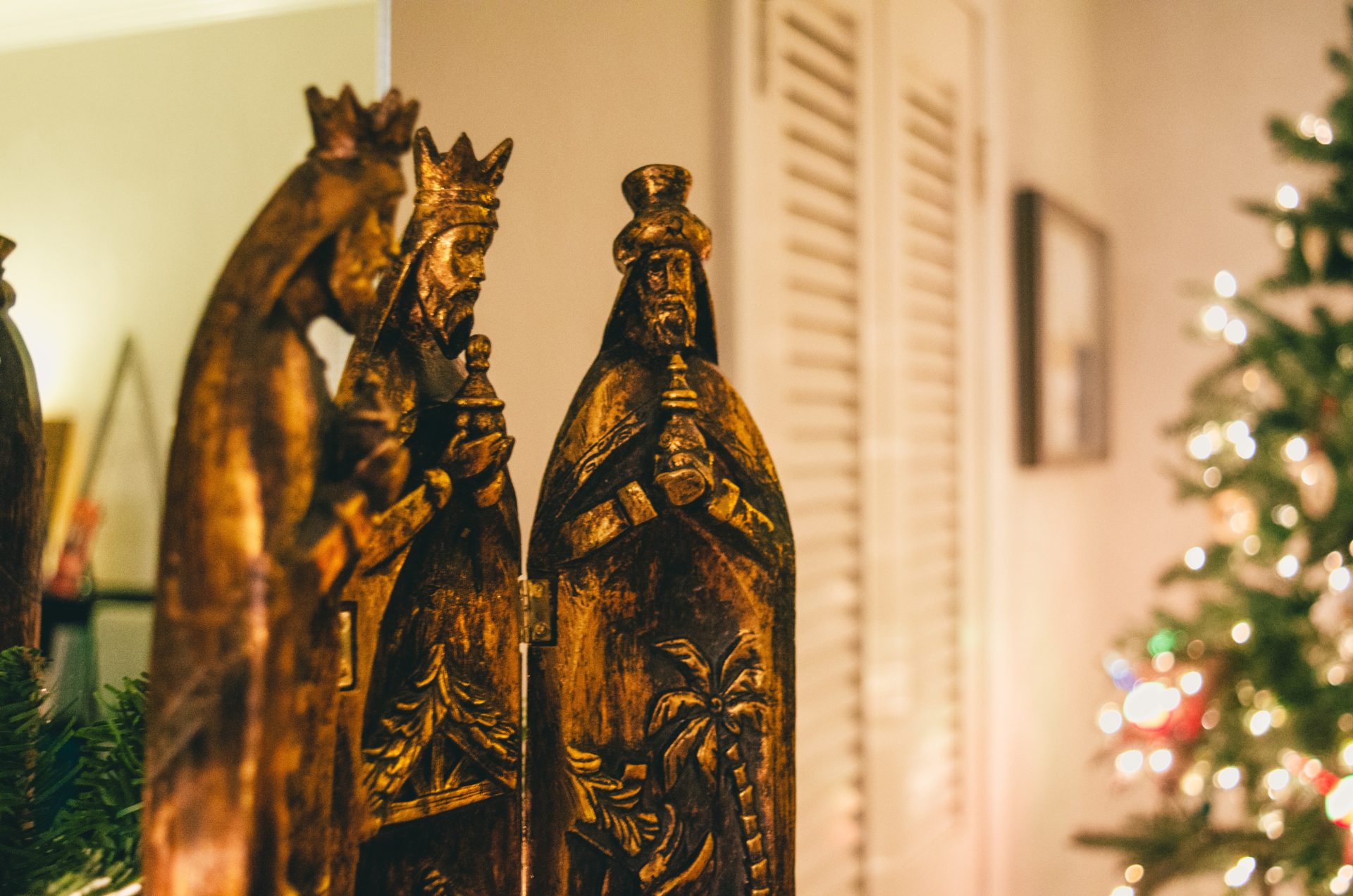
Photo by Jonathan Meyer on Unsplash
Fragrant like frankincense
“The words which express our faith… are fragrant like frankincense…”[i]
“On entering the house, they saw the child with Mary his mother, and they knelt down and paid him homage. Then, opening their treasure chests, they offered him gifts of gold, frankincense, and myrrh.” (Matthew 2:11)
A member of my church gave me a treasure I have enjoyed and used for children’s sermons. It is a small wooden treasure chest, adorned with brass decorations, which contains the gifts of the Magi: frankincense and myrrh (no gold, but that was symbolized by the brass). Her gift caused me to dig deeper into the symbolism of the Magi’s gifts—particularly, the gift of frankincense. Could there be a meaning for our lives today symbolized in this gift to the babe in the manger? How could it apply to us, for frankincense symbolized a gift to a priest?
You are a minister. If you are a Christian, you are a minister. To minister means to serve. This idea, often noted in weekly church bulletins, is that every member is a minister. This stems from the Protestant Reformation’s core value lifting up the priesthood of all believers. Regardless of your occupation, your other vocation is ministry.
So then, if all members are ministers, what do clergy do? When Quaker philosopher D. Elton Trueblood preached the sermon at my ordination, this was his verse, which answers the question of the role of clergy: “He handed out gifts of apostle, prophet, evangelist, and pastor-teacher to train Christ’s followers in skilled servant work, working within Christ’s body, the church, until we’re all moving rhythmically and easily with each other, efficient and graceful in response to God’s Son, fully mature adults, fully developed within and without, fully alive like Christ.” (Ephesians 4:11-13, The Message). The job description of clergy, as pastor-teacher, is to equip God’s people in skilled servant work. To serve is to minister. So, clergy equip, educate, train, encourage, and open doors for all members to fulfill their vocation as ministers. In worship, the role of clergy is to lead the faithful into an encounter with the Divine. Out of that encounter springs the call for work in God’s service. What was once the work of only a priestly caste now applies to you. You are a minister.
The word for priest in Latin comes from pontifex which means, literally, a bridge builder. Building bridges was the job for priests in the past, and that is the job for every Christian now. That should always be the task for a minister: to build bridges. As a minister, your calling is to build bridges across whatever is divided.
The gift of frankincense was a gift for a priest, symbolizing that Jesus was the priestly intermediary between humans and God. The gift of frankincense, first given to the babe in the manger, now becomes a gift to you and a symbol of your ministerial service as an ambassador for Christ, ministering in his name to bring people together again in reconciliation.
Building bridges – connecting that which is separated – could be considered the ministry of reconciliation, which is to bridge together that which is separated. Here Paul clarifies the role of every Christian: “All this is from God, who reconciled us to himself through Christ, and has given us the ministry of reconciliation; that is, in Christ God was reconciling the world to himself, not counting their trespasses against them, and entrusting the message of reconciliation to us. So we are ambassadors for Christ, since God is making his appeal through us” (2 Corinthians 5:18-20). The ministry of every Christian is to engage in the ministry of reconciliation – to bring together that which is separate.
Separation occurs on an individual level, in families, friends, coworkers, neighbors, and church members. But think more broadly too about the levels of injustice in our sphere which separate one from another. Racial justice, falling behind. Justice for women, half our population: making giant leaps in reverse. Justice for humans leaving intolerable conditions to seek safety and hope in another place: ship them to the Massachusetts island of Martha’s Vineyard. Justice for LGBTQ people who simply want freedom to be themselves and to love who they want to love: condemn them and even render them illegal, in some places. Jews were persecuted by Adolf Hitler in Germany, and they continue to be persecuted in places today. Palestinians armed only with stones and bottles face sophisticated weapons of war and some are stripped of their homes. And here, in our own nation, divisiveness raises its ugly head more boldly than ever before. If you were to ask people from just about anywhere in the world to describe America, they might answer “divided,” which is an interesting description for a country known as the United States. The divisiveness of our nation is causing high levels of anxiety, disconnectedness, and feelings of helplessness. Separation one from another exists in your family, your neighborhood, your workplace, and your church.
A worthy self-query might be “How can I contribute to building bridges across the divide? What can be my ministry of reconciliation? Am I part of the problem or part of the solution?” You are a minister. God has entrusted to you the ministry of reconciliation, bringing together that which is divided. You are called to build bridges between people. You are called to build bridges between others and God. Reconciliation means to bring together again. Pray for those who are apart to come together again.
Is there a Christmas pageant anywhere which does not portray three regally adorned kings carrying their gifts of gold, frankincense, and myrrh to the baby in the manger, accompanied by the hymn “We Three Kings”? The gift of frankincense was a gift for a priest, symbolizing that Jesus was the priestly intermediary between humans and God. Frankincense is a hardened gum-like material, a resin that comes from the trunk of the Boswellia tree, native to the Arabian Peninsula (Oman, Yemen), and Horn of Africa (Somalia). People use its oil on the skin and in aromatherapy. Frankincense is used as a fragrance in soaps, lotions, and perfumes. Frankincense is rare and expensive. You can buy it today on Amazon or natural food stores. It was an expensive and worthy gift for Jesus, symbolizing his role as a priest…an intermediary between us and God.
But now, Jesus has ascended. His role as a bridge-builder has been forwarded, to you, to carry on his ministry. You are called to be a partner in Christ’s service. You are now the pontiff who builds bridges and the minister who labors to bring people together again, to pursue with a passion the bringing together of those who are separated, to be God’s ambassador for reconciliation “until we’re all moving rhythmically and easily with each other, efficient and graceful in response to God’s Son.”
And so, the gift of frankincense, first given to the babe in the manger, now becomes a gift to you and a symbol of your ministerial service as an ambassador for Christ, ministering in his name to bring people together again in reconciliation. The gift of frankincense, along with the responsibilities of its symbol, is now given to you. When you build bridges, you serve God after the manner of the pontifex: a priest. The job of bridge building is far too large to be left to clergy. Every member is needed to build bridges and to carry out the Bible’s call to be ambassadors for Christ in allowing God to make God’s appeal through us.
Rev. John Zehring has served United Church of Christ congregations for 22 years as a pastor in Massachusetts, Rhode Island and Maine. He is the author of more than 30 books and e-books. His most recent book from Judson Press is “Get Your Church Ready to Grow: A Guide to Building Attendance and Participation.”
The views expressed are those of the author and not necessarily those of American Baptist Home Mission Societies.
[i] Thoreau, Henry David. Walden: An Annotated Edition (foreword and notes by Walter Harding). Boston: Houghton Mifflin, 1995, p. 316.



